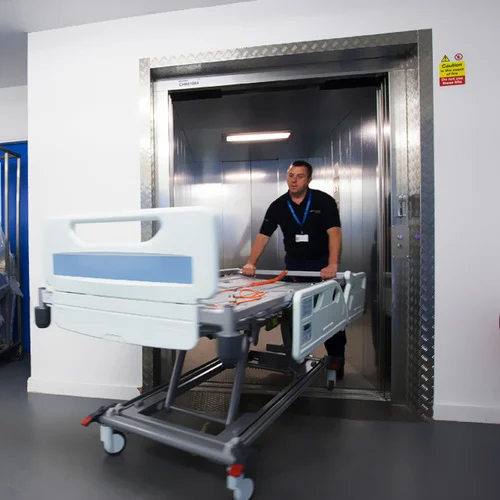

Evaan Elevators Pvt. Ltd., one of the most trusted Hospital Elevator Manufacturers in Delhi, designs and delivers advanced, hygienic, and reliable elevators built specifically for healthcare facilities. From hospitals and clinics to medical centers and nursing homes, our elevators are engineered to ensure safe, silent, and seamless patient transport — combining precision engineering with world-class safety and hygiene standards.
With over three decades of manufacturing excellence, Evaan Elevators provides Hospital Elevators that meet the highest performance and reliability standards. Each elevator is designed for stretcher and bed transportation, featuring smooth start-stop operation, accurate floor leveling, and spacious cabin design for stretchers, attendants, and medical equipment.
Whether you’re building a new hospital or upgrading an existing facility, Evaan Elevators offers fully customized elevator systems to match your infrastructure and capacity needs. Headquartered in Delhi and serving across Lucknow, Chandigarh, Uttarakhand, and other major Indian cities, we have earned the trust of healthcare architects, builders, and administrators for our precision design, long-term reliability, and 24×7 service support.
All our hospital elevators are manufactured in ISO-certified facilities and tested under IS 14665 and EN 81 safety standards, ensuring optimum performance, hygiene, and operational safety. From design and installation to periodic maintenance and modernization, Evaan handles every stage with medical-grade precision.
Evaan Hospital Elevators are designed to meet the demanding needs of medical environments, ensuring smooth operation during critical moments. Our systems include advanced safety measures, anti-bacterial finishes, and energy-efficient drives.
Each hospital elevator is built to minimize vibration, reduce energy use, and deliver maximum comfort for patients and medical staff — even during power interruptions.
As one of the leading hospital lift manufacturers in Delhi, Evaan Elevators is committed to improving healthcare mobility with technology, precision, and care. Our lifts are trusted by top hospitals, clinics, and diagnostic centers across India for their safety, hygiene, and reliability.
At Evaan Elevators, we don’t just build elevators — we build systems that save time, ensure safety, and support life-critical operations.
At Evaan Elevators Pvt. Ltd., we understand the importance of safety, speed, and reliability in healthcare transport. From design to installation, and from maintenance to modernization, our Hospital Elevators in Delhi deliver smooth and dependable vertical mobility for medical environments.
Whether you’re installing a new lift or upgrading an old system anywhere in India, Evaan Elevators is your trusted partner for hospital and stretcher elevator solutions. Contact us today to schedule a free consultation or site assessment — and experience how Evaan Elevators lifts your healthcare standards to the next level.